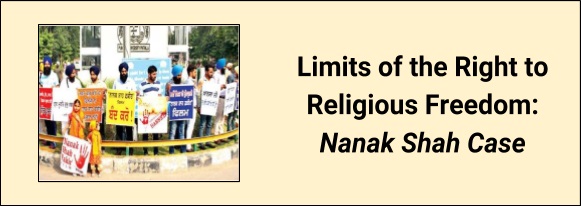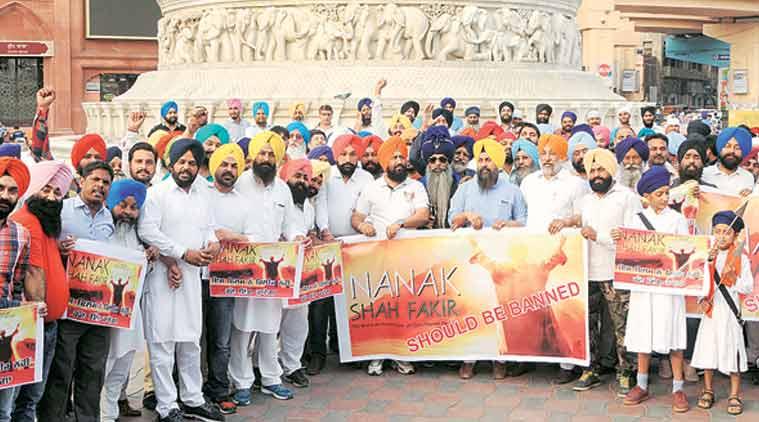Limits of the Right to Religious Freedom - Nanak Shah Case : Important Topics for UPSC Exams

Limits of the Right to Religious Freedom - Nanak Shah Case : Important Topics for UPSC Exams
News:
The Supreme Court on Monday refused to stop screening of the national award winning movie Nanak Shah Fakir, prima facie rejecting a plea by the Shiromani Gurdwara Parbandhak Committee (SGPC) that a movie on Guru Nanak was violative of the community’s right to worship and was against a religious edict that no human being would ever portray any of the gurus or their families.

Constitutional provisions regarding Right to religious freedom and non discrimination on the basis of religion
-
Equality & Non-Discrimination: emphasize complete legal equality of its citizens irrespective of their religion and creed and prohibit any kind of religion-based discrimination between them.
-
Article 14 - The State shall not deny to any person equality before the law or equal protection of the laws.
-
Article 15- The State shall not discriminate against any citizen on grounds only of religion, race, caste, sex, place of birth, or any of them
-
Article 16- There shall be equality of opportunity for all citizens in the matter of employment or appointments under the State and no citizen shall, on grounds only of religion be ineligible for, or discriminated against, in respect of any employment or office under the State.
-
Article 17- The traditional religious concept of 'untouchability' stands abolished find its practice in any form IN .strictly forbidden.
-
Article 23(2)- If the State imposes compulsory service on citizens for public purposes no discrimination shall be made in this regard on the ground of religion only
-
Article 25(1)- All persons are equally entitled to freedom of conscience and the right freely to profess, practise and propagate religion.
-
Article 26- Every religious denomination or any section thereof has the right to manage its religious affairs; establish and maintain institutions for religious and charitable purposes; and own, acquire and administer properties of all kinds
-
Article 27- There shall be freedom as to payment of taxes for promotion of any particular religion by virtue of which no person shall be compelled to pay any taxes the proceeds of which are specifically appropriated in payment of expenses for the promotion or maintenance of any particular religious denomination.
-
Article 28- No religious instruction is to be provided in the schools wholly maintained by State funding; and those attending any State recognized or State-aided school cannot be required to take part in any religious instruction or services without their (or if they are minor their guardian's) consent.
-
Article 29 - Any section of the citizens having a distinct language, script or culture of its own shall have the right to conserve the same.
-
Article 30 - Religious and linguistic minorities are free to establish and administer educational institutions of their choice, which shall not be discriminated against by the State in the matter of giving aid or compensation in the event of acquisition.
Buy Printed Complete Study Materials for UPSC IAS PRELIMS Exam
Online Crash Course for UPSC PRE Exam
Limits on religious freedom
The Fundamental Right to religious freedom cannot be enjoyed in an absolutely unrestricted way.
-
Article 25 - The right to freedom of religion is, in general, subject to public order, morality, health and the other provisions of the Constitution.
-
Article 25(2)- Despite the right to religious freedom, the State can pass laws providing for social welfare and reform and also to regulate or restrict any secular activity - economic, financial, and political, etc. even though it may be traditionally associated with religion
-
Article 29(2)- Despite the minorities' right to establish and maintain educational institutions, no citizen can be kept away from any State-aided or State- maintained educational institution only on religious grounds.
Nanak Shah Case and court’s verdict
-
It is to be noted that Sikhs did not believe in living Gods or idols while the film had actors playing the Guru and His family
-
The Supreme Court made the observation on a plea by Sikhism’s highest religious bodies (SGPC) to stop the release of the National Award-winning and Censor Board-certified movie Nanak Shah Fakir for having a human characterise Guru Nanak.
-
The film won the National Award for promoting national integrity
-
The court noted that the film was only a “venerated projection of Guru Nanak in celluloid language.”
-
The court also noted that a religion cannot be adamant that its sole portrayal should be confined to just one “book.” It cannot say that others are not free to sketch or render their version or ideas about the religion. Such a bar is just not enforceable. If such activities are encouraged, the same has the potentiality to bring in anarchy and cripple the right of freedom of speech and expression
Conclusion:
It must be noted that the right to religious freedom under constitution is subject to other provisions of the constitution of which the freedom of speech and expression is also a part. Further , Supreme court in SR Bommai Case had noted that When the State allows citizens to practice and profess their religion, it does not either explicitly or implicitly allow them to introduce religion into non-religious and secular activities of the State. The freedom and tolerance of religion is only to the extent of permitting pursuit of spiritual life which is different from the secular life. The latter falls in the exclusive domain of the affairs of the State.
MODEL QUESTIONS :
Prelims question
Ques 1. Consider the following statements regarding right to religious freedom
-
The Right to religious freedom is subject to other provisions of the constitution
-
The state can intervene in economic and social activities associated with religion
-
Violation of principle of secularism by the state government is one of the valid reasons for imposition of president’s rule in the stat.
-
Secularism is the basic feature of constitution
Choose the statements which are NOT correct
-
A and C
-
A, B and D
-
B and C
-
None of the above
Correct Answer : d (none of the above)
Mains Questions

